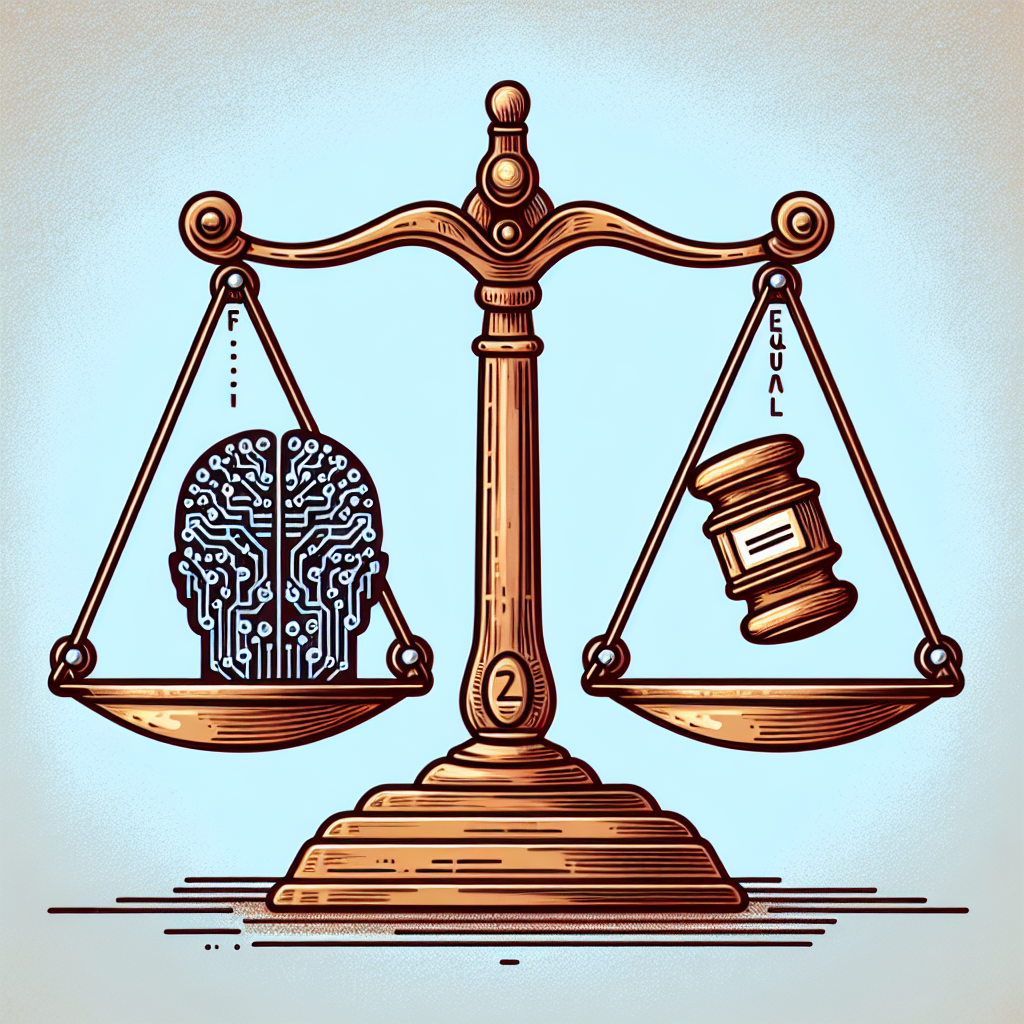Artificial Intelligence (AI) algorithms are becoming increasingly prevalent in our everyday lives, from powering search engines and social media platforms to guiding autonomous vehicles and predicting healthcare outcomes. While these algorithms have the potential to revolutionize industries and improve efficiency, there is growing concern about the fairness and ethical implications of AI decision-making.
Ensuring fairness in AI algorithms is essential to mitigate biases and discrimination that can arise from the data used to train these systems. In this article, we will explore the importance of fairness in AI algorithms, the challenges of achieving fairness, and strategies to address bias in AI systems.
Why is fairness important in AI algorithms?
Fairness in AI algorithms is crucial for several reasons. Firstly, biased algorithms can perpetuate and exacerbate existing inequalities and discrimination in society. For example, if a hiring algorithm is biased against certain groups, it can lead to discriminatory hiring practices that reinforce systemic inequalities.
Secondly, fairness is essential for building trust in AI systems. If users perceive AI algorithms as unfair or biased, they are less likely to trust the decisions made by these systems, which can lead to a lack of adoption and acceptance of AI technologies.
Finally, fairness is a legal and ethical requirement for AI systems. Laws such as the General Data Protection Regulation (GDPR) in Europe and the Fair Credit Reporting Act in the United States mandate that algorithms must be fair and transparent in their decision-making processes.
What are the challenges of ensuring fairness in AI algorithms?
Ensuring fairness in AI algorithms is a complex and multifaceted challenge. One of the main challenges is the inherent bias in the data used to train AI systems. If historical data is biased or reflects societal inequalities, the AI algorithm will learn and perpetuate these biases in its decision-making.
Another challenge is the lack of diversity in the teams developing AI algorithms. Research has shown that diverse teams are more likely to identify and address biases in algorithms, so it is crucial to have diverse perspectives and experiences in the design and development of AI systems.
Additionally, transparency and interpretability are key challenges in ensuring fairness in AI algorithms. Many AI algorithms are black-box systems, meaning that the decision-making process is opaque and difficult to interpret. This lack of transparency can make it challenging to identify and address biases in these systems.
What strategies can be used to address bias in AI algorithms?
There are several strategies that can be used to address bias in AI algorithms and ensure fairness in decision-making processes. One approach is to use fairness-aware algorithms that explicitly incorporate fairness constraints into the optimization process. These algorithms can help mitigate biases and ensure that decisions are fair and equitable for all individuals.
Another strategy is to conduct bias audits and impact assessments of AI systems to identify and address biases in the data and decision-making processes. These audits can help teams understand the potential impact of their algorithms on different groups and take steps to mitigate bias and discrimination.
Furthermore, it is essential to have diverse and inclusive teams developing AI algorithms to identify and address biases. Research has shown that diverse teams are more likely to identify and address biases in algorithms, so it is crucial to have a range of perspectives and experiences in the design and development of AI systems.
In addition, transparency and interpretability are critical for ensuring fairness in AI algorithms. By making AI algorithms more transparent and interpretable, it is easier to identify and address biases in decision-making processes and build trust in these systems.
FAQs:
Q: What is algorithmic bias?
A: Algorithmic bias refers to the systematic and unfair discrimination that can occur in AI algorithms due to biased data or decision-making processes. This bias can result in discriminatory outcomes that disproportionately impact certain groups or individuals.
Q: How can bias be mitigated in AI algorithms?
A: Bias can be mitigated in AI algorithms through several strategies, including using fairness-aware algorithms, conducting bias audits and impact assessments, building diverse and inclusive teams, and increasing transparency and interpretability in algorithms.
Q: What are some examples of bias in AI algorithms?
A: Examples of bias in AI algorithms include discriminatory hiring practices, biased loan approvals, and unfair treatment in criminal justice systems. These biases can result from biased data used to train algorithms or from the decision-making processes themselves.
Q: Why is transparency important in AI algorithms?
A: Transparency is important in AI algorithms because it allows users to understand how decisions are made and to identify and address biases in these systems. Transparent algorithms build trust and accountability in AI systems and help ensure fairness and ethical decision-making.
In conclusion, ensuring fairness in AI algorithms is essential to mitigate biases and discrimination that can arise from the data and decision-making processes used to train these systems. By using fairness-aware algorithms, conducting bias audits, building diverse teams, and increasing transparency, we can address bias in AI algorithms and build trust in these systems. Fairness in AI algorithms is not only a legal and ethical requirement but also a fundamental step towards creating a more equitable and inclusive society.

